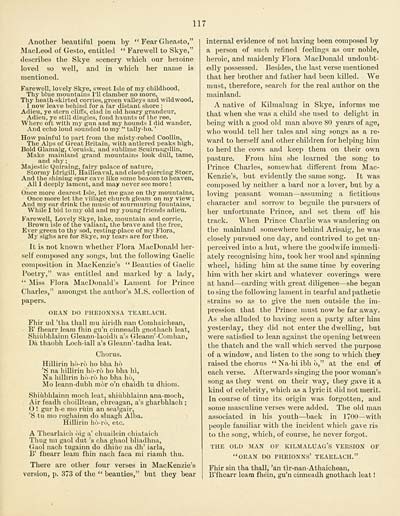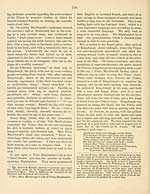Download files
Complete book:
Individual page:
Thumbnail gallery: Grid view | List view

Another beautiful poem by " Fear Gheasto,"
MacLeod of Gesto, entitled " Farewell to Skye,"
describes the Skye scenery which our heroine
loved so well, and in which her name is
mentioned.
Farewell, lovely Skye, sweet Isle of my childhood,
Thy blue mountains I'll clamber no more,
Thy heath-skirted corries, green valleys and wildwood,
I now leave behind for a far distant shore :
Adieu, ye stern cliffs, clad in old hoary grandeur,
How painful to part from the misty-robed Coollin,
The Alps of Great Britain, with antlered peaks high,
Bold Glamaig, Coruisk. and sublime ScuirnagiUin,
Make mainland grand mountains look dull, tame,
and shy;
Majestic Quiraing, fairy palace of nature.
Stormy Idrigill, Hailleaval, and cloud-piercing Stoer,
And the shining spar cave like some beacon to heaven,
All I deeply lament, and may never see more !
Once more dearest Isle, let me gaze on thy mountains.
Once more let the village church gleam on my view ;
And my ear drink the music of murmuring fountains.
While I bid to my old and my young friends adieu.
Farewell, Lovely Skye, lake, mountain and corrie.
Brown isle of the valiant, the brave and the free.
Ever green to thy sod, resting-place of my Flora,
My sighs are for Skye, my tears are for thee.
It is not known whether Flora MacDonald her-
self composed any songs, but the following Gaelic
composition in MacKenzie's " Beauties of Gaelic
Poetry," was entitled and marked by a lady,
" Miss Flora MacDonald's Lament for Prince
Charles," amongst the author's M.S. collection of
papers.
ORAN DO PHRIONNSA TEARLACH.
Fhir ud 'tha thall mu àiridh nan Comhaichean,
B' fhearr leam fhin gu'n cinneadh gnothach leat,
Shiùbhlainn Gleann-laoidh a's Gleann'-Comhan,
Da thaobh Loch-iall a's Gleann'-tadha leat.
Chorus.
Hillirin hò-rò ho blia ho
'S na hillirin hò-rò ho bha hi,
Na hillirin hò-rò ho bha ho,
Mo leann-dubh mòr o'n chaidh tu dhiora.
Shiùbhlainn moch leat, shiiibhlainn ana-moch,
Air feadh choilltean, chreagan, a's gharbhlach ;
! gur h-e mo ruin an sea'gair,
'S tu mo roghainn do sluagh Alba.
Hillirin hò-rò, etc.
A Thearlaich òig a' chuailein chiataich
Thug mi gaol dut 's cha ghaol bliadhna.
Gaol nach tugainn do dhiùc na dh' iarla,
B' fhearr leam fhin nach faca mi riamh thu.
There are other four verses in MacKenzie's
version, p. 373 of the " beauties," but they bear
internal evidence of not having been composed by
a person of such refined feelings as our noble,
heroic, and maidenly Flora MacDonald undoubt-
edly possessed. Besides, the last verse mentioned
that her brother and father had been killed. We
must, therefore, search for the real author on the
mainland.
A native of Kilmaluag in Skye, informs me
that when she was a child she used to delight in
being with a good old man above 80 years of age,
who would tell her tales and sing songs as a re-
ward to herself and other children for helping him
to herd the cows and keep them on their own
pasture. From him she learned the song to
Prince Charles, somewhat different from Mac-
Kenzie's, but evidently the same song. It was
composed by neither a bard nor a lover, but by a
loving peasant woman — assuming a fictitious
character and sorrow to beguile the pursuei's of
her unfortunate Prince, and set them oft' his
track. When Prince Charlie was wandering on
the mainland somewhere behind Arisaig, he was
closely pursued one day, and contrived to get un-
perceived into a hut, where the goodwife immedi-
ately recognising him, took her wool and spinning
wheel, hiding him at the same time by covering
him with her skirt and whatever coverings were
at hand — carding with great diligence — she began
to sing the following lament in tearful and pathetic
strains so as to give the men outside the im-
pression that the Prince must now be far away.
As she alluded to having seen a party after him
yesterday, they did not enter the dwelling, but
were satisfied to lean against the opening between
the thatch and the wall which served the purpose
of a window, and listen to the song to which they
raised the chorus " Na-hi ibh o," at the end of
each verse. Afterwards singing the poor woman's
song as they went on their way, they gave it a
kind of celebrity, which as a lyric it did not merit.
In course of time its origin was forgotten, and
some masculine verses were added. The old man
associated in his youth — back in 1700 — with
people familiar with the incident which gave ris
to the song, which, of course, he never forgot.
THE OLD MAN OF KILMALUAG'S VERSION OF
"OKAN DO PHRIONNS' TEARLACH."
Fhir sin tha thall, 'an tir-nan-Athaichean,
B'fhearr leam fhein, gu'n cinneadh gnothach leat 1
MacLeod of Gesto, entitled " Farewell to Skye,"
describes the Skye scenery which our heroine
loved so well, and in which her name is
mentioned.
Farewell, lovely Skye, sweet Isle of my childhood,
Thy blue mountains I'll clamber no more,
Thy heath-skirted corries, green valleys and wildwood,
I now leave behind for a far distant shore :
Adieu, ye stern cliffs, clad in old hoary grandeur,
How painful to part from the misty-robed Coollin,
The Alps of Great Britain, with antlered peaks high,
Bold Glamaig, Coruisk. and sublime ScuirnagiUin,
Make mainland grand mountains look dull, tame,
and shy;
Majestic Quiraing, fairy palace of nature.
Stormy Idrigill, Hailleaval, and cloud-piercing Stoer,
And the shining spar cave like some beacon to heaven,
All I deeply lament, and may never see more !
Once more dearest Isle, let me gaze on thy mountains.
Once more let the village church gleam on my view ;
And my ear drink the music of murmuring fountains.
While I bid to my old and my young friends adieu.
Farewell, Lovely Skye, lake, mountain and corrie.
Brown isle of the valiant, the brave and the free.
Ever green to thy sod, resting-place of my Flora,
My sighs are for Skye, my tears are for thee.
It is not known whether Flora MacDonald her-
self composed any songs, but the following Gaelic
composition in MacKenzie's " Beauties of Gaelic
Poetry," was entitled and marked by a lady,
" Miss Flora MacDonald's Lament for Prince
Charles," amongst the author's M.S. collection of
papers.
ORAN DO PHRIONNSA TEARLACH.
Fhir ud 'tha thall mu àiridh nan Comhaichean,
B' fhearr leam fhin gu'n cinneadh gnothach leat,
Shiùbhlainn Gleann-laoidh a's Gleann'-Comhan,
Da thaobh Loch-iall a's Gleann'-tadha leat.
Chorus.
Hillirin hò-rò ho blia ho
'S na hillirin hò-rò ho bha hi,
Na hillirin hò-rò ho bha ho,
Mo leann-dubh mòr o'n chaidh tu dhiora.
Shiùbhlainn moch leat, shiiibhlainn ana-moch,
Air feadh choilltean, chreagan, a's gharbhlach ;
! gur h-e mo ruin an sea'gair,
'S tu mo roghainn do sluagh Alba.
Hillirin hò-rò, etc.
A Thearlaich òig a' chuailein chiataich
Thug mi gaol dut 's cha ghaol bliadhna.
Gaol nach tugainn do dhiùc na dh' iarla,
B' fhearr leam fhin nach faca mi riamh thu.
There are other four verses in MacKenzie's
version, p. 373 of the " beauties," but they bear
internal evidence of not having been composed by
a person of such refined feelings as our noble,
heroic, and maidenly Flora MacDonald undoubt-
edly possessed. Besides, the last verse mentioned
that her brother and father had been killed. We
must, therefore, search for the real author on the
mainland.
A native of Kilmaluag in Skye, informs me
that when she was a child she used to delight in
being with a good old man above 80 years of age,
who would tell her tales and sing songs as a re-
ward to herself and other children for helping him
to herd the cows and keep them on their own
pasture. From him she learned the song to
Prince Charles, somewhat different from Mac-
Kenzie's, but evidently the same song. It was
composed by neither a bard nor a lover, but by a
loving peasant woman — assuming a fictitious
character and sorrow to beguile the pursuei's of
her unfortunate Prince, and set them oft' his
track. When Prince Charlie was wandering on
the mainland somewhere behind Arisaig, he was
closely pursued one day, and contrived to get un-
perceived into a hut, where the goodwife immedi-
ately recognising him, took her wool and spinning
wheel, hiding him at the same time by covering
him with her skirt and whatever coverings were
at hand — carding with great diligence — she began
to sing the following lament in tearful and pathetic
strains so as to give the men outside the im-
pression that the Prince must now be far away.
As she alluded to having seen a party after him
yesterday, they did not enter the dwelling, but
were satisfied to lean against the opening between
the thatch and the wall which served the purpose
of a window, and listen to the song to which they
raised the chorus " Na-hi ibh o," at the end of
each verse. Afterwards singing the poor woman's
song as they went on their way, they gave it a
kind of celebrity, which as a lyric it did not merit.
In course of time its origin was forgotten, and
some masculine verses were added. The old man
associated in his youth — back in 1700 — with
people familiar with the incident which gave ris
to the song, which, of course, he never forgot.
THE OLD MAN OF KILMALUAG'S VERSION OF
"OKAN DO PHRIONNS' TEARLACH."
Fhir sin tha thall, 'an tir-nan-Athaichean,
B'fhearr leam fhein, gu'n cinneadh gnothach leat 1
Set display mode to: Large image | Transcription
Images and transcriptions on this page, including medium image downloads, may be used under the Creative Commons Attribution 4.0 International Licence unless otherwise stated. ![]()
| Early Gaelic Book Collections > Ossian Collection > Macdonald bards from mediaeval times > (127) |
|---|
| Permanent URL | https://digital.nls.uk/80461925 |
|---|
| Description | Selected books from the Ossian Collection of 327 volumes, originally assembled by J. Norman Methven of Perth. Different editions and translations of James MacPherson's epic poem 'Ossian', some with a map of the 'Kingdom of Connor'. Also secondary material relating to Ossianic poetry and the Ossian controversy. |
|---|
| Description | Selected items from five 'Special and Named Printed Collections'. Includes books in Gaelic and other Celtic languages, works about the Gaels, their languages, literature, culture and history. |
|---|

